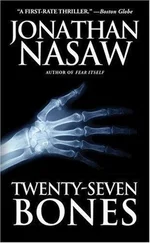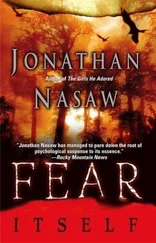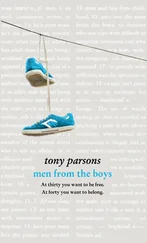Jonathan Nasaw - The Boys from Santa Cruz
Здесь есть возможность читать онлайн «Jonathan Nasaw - The Boys from Santa Cruz» весь текст электронной книги совершенно бесплатно (целиком полную версию без сокращений). В некоторых случаях можно слушать аудио, скачать через торрент в формате fb2 и присутствует краткое содержание. Жанр: Триллер, на английском языке. Описание произведения, (предисловие) а так же отзывы посетителей доступны на портале библиотеки ЛибКат.
- Название:The Boys from Santa Cruz
- Автор:
- Жанр:
- Год:неизвестен
- ISBN:нет данных
- Рейтинг книги:5 / 5. Голосов: 1
-
Избранное:Добавить в избранное
- Отзывы:
-
Ваша оценка:
- 100
- 1
- 2
- 3
- 4
- 5
The Boys from Santa Cruz: краткое содержание, описание и аннотация
Предлагаем к чтению аннотацию, описание, краткое содержание или предисловие (зависит от того, что написал сам автор книги «The Boys from Santa Cruz»). Если вы не нашли необходимую информацию о книге — напишите в комментариях, мы постараемся отыскать её.
The Boys from Santa Cruz — читать онлайн бесплатно полную книгу (весь текст) целиком
Ниже представлен текст книги, разбитый по страницам. Система сохранения места последней прочитанной страницы, позволяет с удобством читать онлайн бесплатно книгу «The Boys from Santa Cruz», без необходимости каждый раз заново искать на чём Вы остановились. Поставьте закладку, и сможете в любой момент перейти на страницу, на которой закончили чтение.
Интервал:
Закладка:
“The only possible way anyone could have done that much damage,” Dr. Flemm had added, “was to climb on top of this desk here, jump down and land on her with both feet, then climb back up and do it again-maybe ten, fifteen times.”
“Oh, Christ.” The homicide detective had sounded almost awed.
9
Highway 17 was somewhat intimidating in the dark. Skip was glad they’d taken the Buick, especially when the truck drivers decided to make up on the narrow, twisting downhill stretches the time they’d lost on the uphill climbs. But the highway leveled out on the other side of the mountains, and they reached the medical center, which appeared to have been built with giant see-through Legos, around eleven-thirty on Saturday night.
Once again Skip used his blue placard to claim a prime parking space. They took the elevator up to the burn unit, where the restive quiet was accentuated by the muted wheezing of respirators, the soft beeping of monitors, the whispered conversations of nurses padding about on rubber-soled shoes.
The charge nurse was waiting for them with sterile caps, gowns, gloves, and masks. “Infection is the burn patient’s most dangerous enemy,” she explained, sounding like she was quoting from a manual. She even subjected Pender’s badge case, notebook, and half-chewed pencil stub to a UV-ray decontamination before allowing him to enter Dr. Hillovi’s room.
The patient lay on his right side, swaddled fore and aft with ointment-stained dressings, and covered by a sheet supported by a frame to keep it from touching his skin. “Pardon me if I don’t get up,” he said, in an urbane, British-inflected Czech accent. Dr. Hillovi had colorless, quarter-inch stubble for hair and a long, narrow face anchored by an aristocratically aquiline nose.
“We’ll give you a pass, considering the circumstances.” Pender, mountainous in green, his face masked, held his badge in front of the doctor’s eyes. “I’m Special Agent Pender, this is Mr. Ep- stine. ”
“Fredu Hillovi. What can I do for you gentlemen?”
“We were wondering if we could ask you a few questions about one of your former patients at Meadows Road,” said Pender.
“Within the bounds of confidentiality, of course.”
“Of course.”
“And the patient’s name?”
“Charles Mesker.”
“Charles Mesker?” Hillovi appeared to have been taken by surprise but recovered quickly. “Ah, yes, poor Charles. I remember that, when I saw his name listed among the casualties, I was almost, well, not exactly happy about it, but I thought, at least he’s finally at peace.”
“Not exactly,” said Pender.
“Oh?”
“Charles Mesker and another patient appear to have escaped from the facility after the fire.” Skip noticed that Pender was now echoing Hillovi’s choice of words and relatively formal diction. “The other patient, the man whom we believe was actually responsible for setting the initial explosion in the boiler room, later died of injuries sustained in the explosion. Mesker, though, is still very much at large.”
Hillovi closed his eyes. Thirty seconds or so-an eternity in burn unit time-wheezed and beeped and whispered by before he opened them again. “This other patient, the one who caused the fire-it was Luke Sweet, wasn’t it?”
Pender was startled; his eyebrows bobbed upward, momentarily wrinkling the prodigious expanse of brow between themselves and the green surgical cap perched like a beanie atop his big bald head. “How did you know?”
“There’s an old Czech saying, my friend: if you want to find the truth, look for it among your fears.” The psychiatrist’s eyes were still open, but his gaze had turned inward. “First, do no harm,” he muttered softly, more to himself than to his visitors. “Ha!”
Another eternity ticked by. Skip, sitting on the molded plastic chair by the head of the bed, was exhausted and wanted to hurry the interview along. But when he glanced over his shoulder at Pender, who was standing behind him, Pender shook his head almost imperceptibly. There were two kinds of silence employed by reluctant subjects, he explained to the Academy recruits every year when he gave his lecture on the art of affective interviewing. One meant make me talk, and required more aggressive questioning; the other meant let me talk, and required only patience.
Clearly, Dr. Hillovi belonged to the let-me-talk camp. It took him another minute to get started, but once he got going, there was no stopping him until he’d finished unburdening.
“On some level, I think I must have known all along,” he began quietly, speaking with a sort of bemused intensity. “I just didn’t want to admit it-not even to myself.” He looked from Skip to Pender and back; his eyes were gray, Skip noticed, and the pupils so dilated he could see his reflection in their curved, black mirrors.
“When I took charge of his psychiatric care two years ago, I was dismayed to learn that Luke Sweet had been under continuous chemical restraint since his admission over seven years earlier.
“To some extent, this was understandable. Young Sweet, who’d scored an impressive thirty-nine on the Psychopathy Checklist, seemed to have a penchant for unprovoked attacks on nurses and orderlies. And since no one’s ever developed an even remotely successful treatment protocol for psychopathy, chemical restraint certainly had to be considered as a viable alternative to a straitjacket and a padded cell.
“But not continuous chemical restraint. Because while there is no known treatment for psychopathy, there is a kind of self-correcting mechanism that sometimes comes into play with maturity.
“Most psychopaths, you see, are highly intelligent, testing out at ten to twenty points higher than the norm. This enables some of them, in the fullness of time, to reason out intellectually what most of us learned and internalized in early childhood: how to moderate one’s behavior in order to achieve rewards and avoid punishments.
“In life, if he learns it early enough (I say he because almost all psychopaths are male), he becomes a so-called successful psychopath: a politician, a captain of industry, or yes, even a doctor. Or if he figures it out after he’s already in prison, which is where the majority of psychopathy diagnoses are made, he might very well transform himself into a model inmate, even a mentor for other prisoners.
“But under continuous high-dosage chemical restraint, Sweet would never have had the opportunity to mature intellectually, nor would we have known it if he had. This means that, along with the opportunity of injuring others, he’d also been deprived of any chance he’d ever have to help himself.
“So my first decision when I was assigned the case was to cut back on the number of medications and reduce the dosages of the drugs we continued to administer. And when there was no immediate amelioration of the side effects, which included lethargy, emotional dullness, and most alarmingly, moderate to severe tardive dyskinesia-facial tics, uncontrollable grimacing, loss of motor control-I ordered further cutbacks.
“By mid-April, after two years of the new drug regimen, Luke Sweet was to all intents and purposes drug-free. Yet still the side effects, including the dyskinesia, continued unabated. I was of course concerned that my patient had suffered permanent damage to his nervous system as a result of extended chemical restraint, and scheduled him for a complete neurological workup in May.
“And yes, I did realize there was a possibility he might be feigning the symptoms in order to avoid whatever criminal charges he would have faced if he were ever declared compos mentis. But it never occurred to me he might be planning to blow the entire hospital to kingdom come.”
Читать дальшеИнтервал:
Закладка:
Похожие книги на «The Boys from Santa Cruz»
Представляем Вашему вниманию похожие книги на «The Boys from Santa Cruz» списком для выбора. Мы отобрали схожую по названию и смыслу литературу в надежде предоставить читателям больше вариантов отыскать новые, интересные, ещё непрочитанные произведения.
Обсуждение, отзывы о книге «The Boys from Santa Cruz» и просто собственные мнения читателей. Оставьте ваши комментарии, напишите, что Вы думаете о произведении, его смысле или главных героях. Укажите что конкретно понравилось, а что нет, и почему Вы так считаете.












